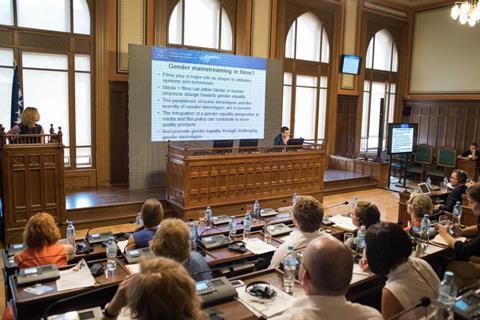Declaration on gender equality in the European film industry adopted during a conference at the Sarajevo Film Festival.

Representatives from ministries of culture and film funds from across Europe have agreed on a declaration that calls for policies to counter the gender imbalance in the audio-visual industry.
The conference – entitled Women in today’s film industry: gender issues. Can we do better? – was held in Sarajevo on Friday (Aug 14), the opening day of Sarajevo Film Festival.
The declaration emphasizes that “a true democracy must make full use of the skills, talents and creativity of women and men alike”, and calls on the Council of Europe to encourage its member states to implement policies to reduce gender imbalance in the European audio-visual industry.
It also proposes that a number of activities be carried out through the Eurimages fund, including to:
- encourage member states to produce gender-based statistics and analyse the causes of the marginalisation of women;
- encourage member states to adopt equality policies aimed at improving the access to public funding for women;
- develop measures for improving gender balance in decision-making posts in the industry;
- enhance the visibility of female filmmakers;
- raise awareness through conferences, publishing studies collecting and disseminating examples of best practice;
- encourage film-makers to be more sensitive to on-screen female representation.
Click here for the full declaration
Speaking to ScreenDaily, Isabel Castro, deputy executive director at the Eurimages film fund, said: “From 2000-2012, the average number of films directed by women in Europe was 16.3%, and this has not really increased in the last five years.
“In France – the biggest producer of films in Europe – the average is 22%. We need to explore why these figures are so low.
“Analysis shows that the proportion of women in film schools is even so they start in the profession but don’t become directors. They are made to think it is too ambitious and aren’t encouraged to become directors.
“There is also a drop when it comes to women making a second film. Things will improve when women are allowed to fail as much as men.”
Throughout the day, a number of expert speakers from organisations including national film funds and the EWA (European Women’s Audiovisual network) shared case studies and examples of best practice from their respective countries.
The conference was organized by the ministries of Civil Affairs, Foreign Affairs and Sarajevo Film Festival in the framework of Bosnia and Herzegovina’s Chairmanship of the Council of Europe’s Committee of Ministers, and was attended by representatives from ministries of culture and film funds from across Europe. Adil Osmanović, Minister of Civil Affairs of Bosnia and Herzegovina opened the Conference.
























No comments yet